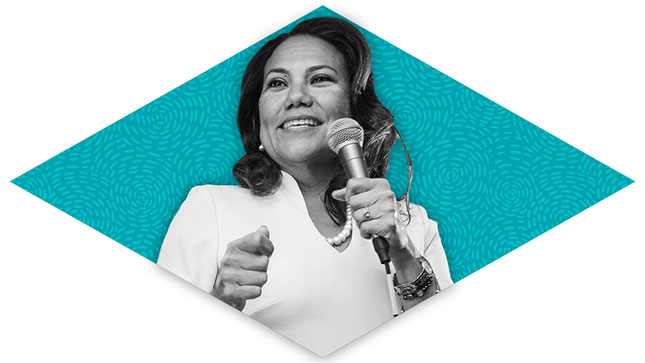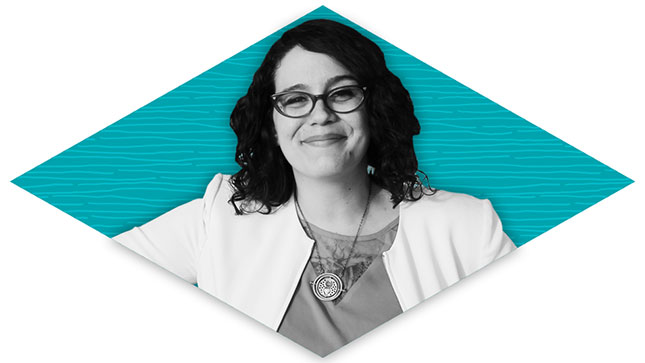Latina Leaders to Watch 2018


Angie Chirino
Growing up the daughter of famous Cuban-American musician Willy Chirino, Florida Republican Angie Chirino is used to the spotlight. She and her siblings would hit the road to tour with her father, who is a beloved musician in the Cuban-American community and won a Latin Grammy Lifetime Achievement award a few years ago.
With music in her blood, Chirino struck out on her own — performing music she wrote and also writing for musicians including Gloria Estefan, Celia Cruz and Marc Anthony. She won a Latin Grammy for her work with Anthony.
{mosads}But as a single mother, it was difficult to juggle the late hours of a music career with caring for her daughter. So, on the advice of a friend, she joined a local school that worked with children who have autism, leading to a second career that’s become central to her decision to run for Congress to replace retiring Rep. Ileana Ros-Lehtinen (R).
“Sometimes the life you imagine for yourself is different than the one out there looking for you,” Chirino told The Hill.
Chirino, 49, began bringing her guitar to the classroom, where she said many of the young students were instantly captivated by the music.
“The minute I’d strum my guitar, they’d look at me like, ‘Wow! Look at that,’ ” she remembered. “I discovered I could make a difference, and it felt good.”
After 11 years, Chirino left the school to join a nonprofit that worked with foster children. There, she worked in a variety of roles, including serving as a “guardian ad litem,” an advocate for children in court. The experience cemented Chirino’s interest in running for office.
“You never know what life might offer you — helping others helps you,” she said.
“I want to take that message I’ve been delivering on a small scale for 15 years to the big stage and tell the people of this country — you are not a product of your circumstances, you are a product of your decisions, and I am here to help.”
Chirino is in for a tough climb thanks to the crowded nature of the race and the fact that President Trump lost Florida’s 27th District by about 20 points in 2016. But she said prospective candidates shouldn’t shy away from their beliefs. For example, instead of tamping down her support for Trump’s border wall, she tries to explain the policy to voters so they understand why she would support it.
“Stand your ground, make sure you know what it is you are fighting for and don’t debate, don’t be afraid to say things that are unpopular,” she said. “Make your case with compassion, but make your case.”
— Ben Kamisar

Veronica Escobar
Veronica Escobar is well on her way to becoming the first Latina Texas ever sends to Congress.
But she quit a job she loves to get there.
Escobar was El Paso County judge — an administrative position akin to county executive — for two terms before incumbent Rep. Beto O’Rourke (D), from the state’s 16th Congressional District, announced his run for Senate.
“I would’ve been delighted for him to be a member of Congress for many, many more years,” said Escobar.
Escobar, representative of a young generation of pragmatic and progressive El Paso politicians, wanted to make sure the border city’s voice kept being heard in Washington.
“I just felt there would be a void that unless we had someone who would step in after him who was as strong an advocate as he is for the truth and for border values,” she said.
“I decided to leave a job I love very much, and I quit,” added Escobar.
Escobar, first as county commissioner and then as judge, passed sweeping reforms to local government, fighting what she calls a “good old boys system that led to four of my predecessors pleading guilty for corruption.”
Local government suited her. “It’s the place where you can make relatively quick sweeping changes to a community,” she said.
Escobar, 48, is aware that change in Congress comes slowly, but she feels a sense of duty.
“It will be interesting to be in a place where change is not easy,” she said, before quickly adding, “Hopefully Democrats will have a majority.”
“I feel like there’s a war that’s going on in Washington, D.C., and I felt that I needed to enlist,” said Escobar.
And the border is at the center of that war.
“It’s incredible how things have come full circle, but it was the immigration debate that initially pulled me into politics,” said Escobar.
“Things have only gotten worse since then as we’ve seen over the last couple of weeks,” she added, referring to the more than 2,000 children separated from their families as part of President Trump’s “zero tolerance” immigration policy.
Escobar said she’s hopeful she’ll join a Congress with many new faces. She said a “critical mass” of new people could make a difference, especially for relatively isolated communities like El Paso.
Escobar and O’Rourke are part of a group of young Democrats who came up politically in El Paso as challengers to the Democratic establishment.
That included help from conservative donors who knew the region was unlikely to elect a Republican.
“El Paso is really isolated,” Escobar said. “We’ve kind of had to fend for ourselves in many ways.”
But as county judge, she also butted heads with those conservatives on issues like health care.
Escobar said rapid growth created resentment, but with that came independence.
“We didn’t feel like we need anybody’s permission to offer up our passion from El Paso,” she said.
Escobar hopes to bring that passion to Washington and take on Trump’s policies.
“He is the swampiest of the swamp monsters who has ever lived,” she said.
— Rafael Bernal

Talia Fuentes
Five years of interviewing musicians as a radio show host in Arizona taught Talia Fuentes that there are two kinds of people: rock stars and artists.
The rock stars, she said, were driven by materialism — satisfied as long as they got a large bonus from a record company and could flirt with women. The artists, on the other hand, sincerely wanted to hone their craft and took any paycheck because it allowed them, at least, to “put something out into the world that they’re proud of.”
“We have way too many rock stars in politics and not enough artists,” she told The Hill. “And I think a lot of it is really connected to corporate gain and to the influence of special interests.”
Fuentes, a single mother, grew up in a working-class household, where she learned how to live frugally, and says her upbringing helps her relate to voters.
“I know what it’s like to have to drive to a job interview at two in the afternoon, with no A/C in my car in the 120-degree Arizona summer,” she said.
Fuentes, 32, is now running as a Democrat to represent Arizona’s 9th Congressional District, a seat being vacated by Rep. Kyrsten Sinema (D), who is vying for retiring Sen. Jeff Flake’s (R) post.
She credits her entry into politics to Sen. Bernie Sanders’s (I-Vt.) 2016 presidential bid.
In her campaign, she is advocating for “Medicare for all,” one of Sanders’s signature issues; a legislative solution to help beneficiaries of the Deferred Action for Childhood Arrivals program; gun reform; and increased benefits for teachers.
With a degree in applied biology and stints as a radio host, tattoo shop manager and tech entrepreneur, Fuentes’s résumé is also much more diverse than the typical candidate.
Touting her science and tech expertise, she wants the U.S. to focus on building a firewall to safeguard the country’s digital security instead of a physical wall along the southern border with Mexico.
“A lot of it is focused on helping the most vulnerable in our country,” Fuentes said about her platform. “I think it’s a country’s bare minimum to help keep their citizens alive.”
And as a woman, Fuentes knows she faces other obstacles.
She said women in politics are treated like contestants in a “beauty pageant,” required to dress and wear their hair a certain way.
She has a saying: “Dress every day like you’re going to meet Michelle Obama.”
But she says those barriers should not dissuade young Latinas from getting into politics.
“There are people that need to hear our voices, be a part of the conversation and know that there are women like us willing to fight regardless of what the status quo tells us,” she said.
— Jesus Rodriguez

Sylvia Garcia
Texas state Sen. Sylvia Garcia (D) ran for Congress for the first time in 1992, which is commonly referred to as the “Year of the Woman.”
Now, 26 years later, she’s poised to make history as one of the first Texas Latinas elected to Congress in another year when women running for office are expected to make historic gains.
While it’s been more than two decades since her last congressional run, Garcia said that many of the same problems still exist.
“It’s different because you build on the foundation that you started, but regretfully the issues are still the same,” Garcia said. “But it feels different in that it’s about protecting the gains that we have made and making sure that we have those to pass it along to the next generation because so much of it is under attack.”
Garcia, 67, has held a number of local positions in Texas and was elected to the state legislature in 2013. Throughout her career, she said her priorities have been “trying to make a difference for working families and women in the most vulnerable populations.” For Garcia, that includes working on health care and legislation that benefits children.
In Texas’s March primaries, Garcia won her Democratic contest over a challenger backed by Senate Minority Leader Charles Schumer (D-N.Y.) in the race to succeed retiring Rep. Gene Green (D). Green represents the 29th District, outside of Houston, which is overwhelmingly Hispanic and considered a safe Democratic seat.
While Garcia said that she’s fortunate for having a base of donors, she bemoaned the hurdles that remain for Latino and Latina candidates in access to donors and fundraising. She said both parties must work to make more resources available for these candidates, especially first-time challengers.
“We’ve got a great number of good, talented people who are passionate, who want to make change or want to do better,” she said. “But if we can’t provide the funding and resources, then they can’t get there, so I think that’s a lot of work that both parties need to do.”
Garcia isn’t the only woman likely to be among the first Latinas elected to Congress from Texas. Veronica Escobar, a former El Paso County judge, also won her Democratic primary in the race to replace Rep. Beto O’Rourke (D).
Garcia said the victories of “two pro-choice progressive women from Texas” are emblematic of the changing nature of the party.
“I mean if that doesn’t send a message of the changing face of the Democratic Party, nothing does,” she said.
— Lisa Hagen

Juana Matias
In her first few months as a state representative in Massachusetts, Juana Matias (D) said she would sometimes get stopped by security officers who mistook her for a staffer.
Matias, 30, who became one of the first Latina immigrants elected to the legislature when she unseated a longtime Democratic incumbent in 2016, said those situations gave her an opportunity to show people there are young Latinas involved in government.
“There are countless situations where I do encounter people and they question my merit, my intelligence, my capacity,” she said. “For me, it’s an opportunity to educate them … that yes we do have young women of color who are intelligent, who have the ability and capacity to advocate on behalf of their community.”
Matias came to Massachusetts at the age of 5 with her family from the Dominican Republic. She attended public schools and graduated from University of Massachusetts, Boston, and Suffolk University Law School. Before running for office, Matias worked as a social worker and served as an AmeriCorps legal advocate who mainly focused on asylum work.
In the Statehouse, Matias has been championing the Safe Communities Act, a bill that would, among other things, prevent local and state police officers from asking people about their legal status. She said she’s faced some pushback from within her own party but earned critical support from two state police associations when the legislation was rewritten.
The amended version permits local law enforcement to hold people on Immigration and Customs Enforcement (ICE) retainers for up to six hours if that person has been convicted of a serious crime.
“That’s the kind of work ethic I’ll continue to bring to Washington, D.C.,” she said.
Matias now faces another challenge: She’s running in a crowded open-seat race in the 3rd District currently held by retiring Rep. Niki Tsongas (D). She’s one of nearly a dozen candidates vying for the safe Democratic seat in the Sept. 4 primary.
“There are challenges always to running, especially for women and women of color, who face even greater levels of barriers,” she said. “It’s going to be difficult, it’s not going to be easy, and it’s about staying focus, ensuring you’re able to raise money while you’re doing the field strategy you need to effectively.”
Her advice to other Latinas who are interested in running for elected office? Don’t wait.
“You should not wait to be asked because you’re not going to be asked. You need to be courageous [and] do it for the right reasons,” she said.
— Lisa Hagen

Mary Matiella
Mary Matiella was raised in southern Arizona by her parents, migrant farm workers.
Now she’s running for Congress in the state’s 2nd Congressional District to keep alive “the possibility of somebody being able to achieve the American dream.”
“I went from the cotton fields, where I remember helping my mom pick cotton, all the way to a presidential appointee,” Matiella, 67, told The Hill.
“So, I felt like I really had to step in for the sake of making sure that the American dream, that ability to move forward, is not destroyed. … It helped me, and I want that legacy to survive for future generations.”
She and her husband moved frequently for the Air Force, and Matiella also worked at “every single base he was assigned,” as the couple traveled around the world.
“Not only was I going to be married and be a mom, but I was going to have a career, a very much a feminist kind of point of view,” she said about those years. “I was able to continue my upward climb, for two reasons: Because I was well prepared and I always wanted to make sure that my résumé looked the best.”
That long career as a civilian Defense Department employee eventually led to stints at the Pentagon, then as the chief financial officer for the U.S. Forest Service and as the assistant CFO at the Department of Housing and Urban Development.
Under former President Obama, she returned to the Pentagon, being unanimously confirmed by the Senate as assistant secretary of the Army for financial management and comptroller.
Eventually, she felt the call to return to Arizona.
“Tucson is where my family, my mom and dad and my brothers and sisters are, so this is my home,” she said.
Matiella decided to run for Congress after working on Hillary Clinton’s presidential campaign.
Now on the campaign trail herself, she’s touting her long ties to Arizona and her distinguished career in government.
“I’ve never been [a] politician at the local level, but I sure as hell know how the federal government works. And I sure as heck know southern Arizona because it is where I was raised,” she said “I understand this community.”
Matiella said that with Trump’s election her “identify came into question.”
“I am a person, a woman of color who has an expertise in federal government and I’m going to step in and make sure, that what I worked so hard for 34 years is not undone,” she told The Hill.
“We need representation there,” she added. “I felt like it was my responsibility to step in.”
— Caroline Gardner

Maria Peiro
Maria Peiro came to America as an exile from Cuba when she was 8 years old, along with her father, who was a political prisoner on the island.
She said it was her experience of being embraced on American soil that inspired her to enter public service.
“I feel that I owe this country,” Peiro said.
“I’ve been here so long I’m basically an American,” she added. “I must be an advocate for Americans.”
Peiro, 46, is running to replace retiring Rep. Ileana Ros-Lehtinen (R) in Florida’s 27th Congressional District. It’s her second time running for the seat.
Peiro, a Republican and an avid supporter of President Trump, is vowing to back his policies if elected, rolling back regulations on small businesses and building a border wall.
“I think Latinos are probably the ones that give me the most slack about that because they go, you know, ‘How can you be Hispanic and be against illegal immigration, and how can you be for closing the borders and not letting these people in?’ ” Peiro said.
For her, the answer goes back to her embrace of American citizenship.
“When I see the local picture and I think about immigration, I don’t think of myself as a Hispanic at that moment; I think of myself as an American,” Peiro said.
Still, Peiro comes from a district with a large Hispanic community, one that she says has welcomed her and her campaign.
The teacher and small business owner also says she’ll support term limits for Congress if elected.
Peiro says it hurts districts when lawmakers spend too much time away from home.
“When you’ve been there for such a long time, you kind of detach yourself from what the people are really thinking and saying,” she told The Hill.
And she’s assuring voters they won’t have that problem with her.
“[I] understand better what their needs are because I’m one of them,” Peiro said. “And I’m not moldable because I’m more of a person who listens to the people out there more than I do my party.”
Peiro said her home country of Cuba offered a troubling lesson in what happens if people lack trust in their elected representatives.
“When you have trust in your elected officials as a whole and you feel that you are being represented … people become more engaged,” Peiro said. “We have a civil disengagement which we don’t want to have in this country.”
Latinas are underrepresented in Congress, but Peiro is hoping to change that and is spending her nights on the campaign trail, knocking on doors, calling voters and traveling from event to event.
Yet she still manages to get up every day at 4:30 a.m. to take care of her special needs daughter and teach a third-grade class before hitting the trail.
How does she do it?
“I drink lots of coffee, lots of it,” Peiro said. “Cuban coffee, throughout the day and night.”
— Maya Lora

Lea Marquez Peterson
Arizona Republican Lea Marquez Peterson may be a first-time congressional candidate, but she’s hardly new to politics.
As the head of the Tucson Hispanic Chamber of Commerce, she’s long worked with area politicians, including members of Congress, on a variety of local business issues.
Through meetings with the congresswoman she’s seeking to replace, Rep. Martha McSally (R), as well as former Democratic Reps. Ron Barber and Gabrielle Giffords, Marquez Peterson has had a seat at the table she believes will benefit her as she mounts her first congressional bid.
“I’m coming to this race not as an unknown. The community is used to seeing me,” she told The Hill in an interview.
“I rely on a lot of community leaders who knew me before I was a candidate and know I can win this seat,” Marquez Peterson, 48, said.
While her work brought her close to members like McSally, who is vacating her seat to run for Senate, Marquez Peterson’s interest in the intersection of politics and business started years ago.
As a child, she worked in her father’s insurance agency, cold-calling potential clients and hiring her friends to help. Her family also had a tortilla company and a turquoise shop, among other ventures.
As an adult, Marquez Peterson started a chain of gas stations and convenience stores that grew to 14 locations across the Tucson and Phoenix area.
It was there, dealing with local ordinances and officials, where she realized the importance that local government had on small-business owners. That sparked a curiosity that led to her work at the chamber and eventually to her congressional bid.
Running in Arizona’s 2nd District presents a challenge for any Republican. Marquez Peterson doesn’t just have to make her way through a crowded primary, but she also will likely have a former congresswoman, Ann Kirkpatrick (D), waiting for her in a district President Trump lost in 2016.
Marquez Peterson isn’t deterred — she told The Hill that her constituents are “impressed with the number of important, complex issues that President Trump has addressed,” including foreign affairs and tax reform.
She hopes that women are emboldened to run for Congress to boost her gender’s representation in the House, but she also hopes more Latinas, in particular, may consider running for office.
“It’s something I tell my members all the time: There are votes being taken every day — on the City Council, the Board of Supervisors or in Congress — that are impacting your roads, your schools, your life,” she said.
“Vote — that’s most important. But engage,” she said.
— Ben Kamisar

Maria Elvira Salazar
For three decades, Maria Elvira Salazar has conducted interviews and moderated debates as a broadcast journalist covering politics.
Now, for the first time, she’s finding herself on the other side.
Salazar was a news anchor for Miami-based MEGA TV and hosted a political news show, “Maria Elvira Live.” She left the show earlier this year to run for Congress.
But she believes her former job will make her well-suited to represent the voters of South Florida.
“I’ve covered for 35 years the issues that belong to Miami,” she said.
Salazar, 55, is the daughter of Cuban political refugees who fled to Florida in their 20s. The highlights of her career include interviews she conducted with the late Cuban leader Fidel Castro and the late Chilean dictator Augusto Pinochet — interviews that both took years to snag.
“What we Cuban-Americans have, we have two feelings for this country: not only love … but we have gratitude,” she said. “We’re here because of a loss. My parents lost something for me to have this.”
Salazar is one of more than half-a-dozen Republicans running to succeed retiring GOP Rep. Ileana Ros-Lehtinen, who was the first Latina elected to Congress in 1989. The district, Florida’s 27th, is about 70 percent Hispanic.
Salazar said she’s been approached before to run for office, and this time she got a direct appeal from Ros-Lehtinen.
Florida’s primaries are Aug. 28, and Republicans will face a tough challenge holding on to the seat. Democrat Hillary Clinton won the seat by about 20 points in the 2016 presidential contest.
For Salazar, the issue of immigration is very personal, and she considers it her “specialty.” She says Washington needs to “fix the problem at the root.”
She has started to float her proposal to several lawmakers on Capitol Hill. It would call on President Trump to hold a summit with the three Central American countries that are home to many of the migrant families heading to the U.S.: Guatemala, Honduras and El Salvador.
Salazar has criticized Democrats for previously punting on comprehensive immigration reform during the Obama administration. But she’s also criticized Republicans, saying they need to do more to better court Hispanics because “it’s a party that could be their home.”
“I want to help the Hispanic delegation. I want to help my congressional delegation to explain to our party when it comes to immigration, we need to do it another way,” Salazar said.
— Lisa Hagen

Jana Sanchez
Texas Democrats have high hopes for Jana Sanchez this November.
Sanchez won the Democratic runoff last month in the state’s 6th Congressional District, a district that hasn’t elected a Democrat in 35 years.
Now, expectations are growing that Sanchez could pull off one of the biggest upsets in Texas politics this year.
Sanchez, 53, has been knocking on doors six days a week for the past two months.
“It’s an open seat, so we think it’s going to be possible to get a lot of independents, and maybe people who have voted Republican in the past, to vote for us this year,” Sanchez said. “We’re really excited.”
Sanchez and her Republican general election opponent, Ron Wright, are vying to replace retiring Rep. Joe Barton (R).
Sanchez says she was inspired to run for Congress by the “anti-immigrant rhetoric” she heard during the 2016 presidential race and takes inspiration from her family’s history.
Sanchez’s grandfather, who raised 27 children, came to the United States from Mexico in 1912 and didn’t receive his citizenship until 1969, a year before he died.
“They were migrant farm workers,” Sanchez said of her grandparents. “They went around the country doing agricultural work and providing the food for America’s tables. In the ’50s they settled in the county where I live now — Ellis County. They became members of the community; their children grew up in the community.”
“I have about 300 relatives in Ellis County who are descendants of my grandfather and grandmother,” Sanchez said touting her close ties to the district.
Sanchez is making immigration her signature issue on the trail. The lifelong Democrat is trying to convince voters that creating a more welcoming environment for immigrants will help the U.S. economy thrive.
“Although we’ve campaigned on economic issues, immigration is an economic issue,” she said. “It’s very important to this district for construction, for agriculture, for food production, for the hospitality industry.”
“There are many immigrants here who keep this country running. Without those immigrants, our economy would grind to a halt — and everyone knows that,” Sanchez added.
Sanchez began her career as a political fundraiser before moving on to work as a journalist for The Baltimore Sun and then Reuters. Most recently, she co-founded and ran CitySavvy, a public relations firm. She hopes to bring the communications skills she’s learned to
Washington.
“I think a lot of the job of Congress is about communication,” Sanchez said. “When you want to be able to pass legislation or support legislation, you need to get people on board with you.”
— Jasper Goodman

Xochitl Torres Small
Xochitl Torres Small is running for Congress, in part, because of her student loans.
Torres Small wants to represent New Mexico’s 2nd District — a vast, rural district bigger than Pennsylvania.
“I’m not looking at it as a stepping stone. I want to serve this community. That’s why I moved back home,” she said.
After graduating from Georgetown University in just three years, Torres Small decided to go back to southern New Mexico, only to see friends and family leave as they sought better opportunities elsewhere.
With outstanding student loans, Torres Small said, the decision to return home was difficult.
New Mexico is the 48th poorest state in the country; its unemployment rate in May was 5.1 percent, compared to the national average of 3.8 percent.
But the Las Cruces native stayed in the southern part of the state, eventually earning a law degree at the University of New Mexico after a stint working for Sen. Tom Udall (D-N.M.).
She’s now a water attorney, a role she says comes naturally because of the particular needs of her desert district.
Torres Small says Washington has long ignored southern New Mexico, failing to act on access to water, broadband, cellular service, transportation, health care and education.
When incumbent Rep. Steve Pearce (R) announced his retirement from the House to seek the governorship, Torres Small began helping recruitment efforts to find a suitable replacement.
During that effort, she came to a realization.
“What if that person is supposed to be me? I realized I couldn’t forgive myself if I didn’t run,” she said.
Torres Small, 33, is a young Latina Democrat running in a relatively safe Republican district — she points out that the district has been represented by the GOP for all but two years of her life.
In 2008, Pearce retired to run for the Senate. In 2010, he unseated Rep. Harry Teague (D), who’d replaced him.
But Torres Small thinks her hometown connection bucks any party affiliation in what she calls a district with a “strong independent streak.”
“People are hungry for new leadership,” she said. “Washington does not understand southern New Mexico.”
And Torres Small said she’s proud to represent a new generation in politics. She’s the same age as the youngest currently serving member of the House, Rep. Elise Stefanik (R-N.Y.).
“I very proudly say I’m 33, and it’s long past time we take responsibility,” Torres Small said.
— Rafael Bernal
Copyright 2023 Nexstar Media Inc. All rights reserved. This material may not be published, broadcast, rewritten, or redistributed. Regular the hill posts










